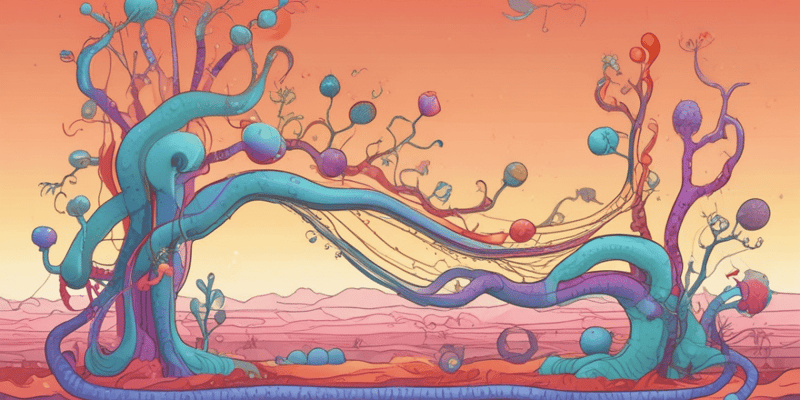24 Questions
How many ATP molecules are created during the generating phase of glycolysis?
4 ATP
What is the net ATP production per glucose molecule in glycolysis?
2 ATP
How many NADH molecules are generated per glucose molecule in glycolysis?
2 NADH
Which reactions in glycolysis are irreversible?
All of the above
Which phase of glycolysis requires ATP?
Preparative Phase
How many ATP molecules are required during the preparatory phase of glycolysis?
2 ATP
What is the role of Mg2+ cofactor in Reaction 1 of glycolysis?
It stabilizes the enzyme
How does Reaction 2 of glycolysis proceed in the forward direction despite having a positive ΔG°?
It is coupled with an exergonic reaction
What is the rate-limiting and committing step of glycolysis?
Reaction 3
What would be the effect on glycolysis if triose phosphate isomerase was not present/able to function?
Glycolysis would stop at Reaction 5
Which enzyme is responsible for Reaction 6 of glycolysis?
Glyceraldehyde-3-phosphate dehydrogenase
What is the ΔG° for Reaction 8 of glycolysis?
4.4 kJ/mol
Which enzyme is responsible for Reaction 9 of glycolysis?
Enolase
Which Enzyme is responsible for the last step of glycolysis?
Pyruvate Kinase
Which enzyme is responsible for the formation of fructose 1,6-bisphosphate?
Phosphofructosekinase 1(PFK-1)
What is the main rate-limiting reaction in glycolysis?
Fructose 6-Phosphate to Fructose 1, 6-biphosphate
Aldolase catalyzes the formation of...
Dihydroxyacetone phosphate + Glyceralaldehyde 3-phosphate
Conversion fo G-6-P to F-6-P is catalyzed by
Phosphoglucose isomerase
Phosphoglycerate kinase will..
Remove a phosphate from biphosphoglycerate
Enolase produces
H2O + Phosphoenolpyruvate
Pyruvate kinase produces...
Pyruvate + ATP
Which enzyme(s) requires magnesium as a cofactor?
Pyruvate kinase
PFK phosphorylates..
F-6-P
Triose phosphate isomerase catalyzes the...
Conversion of DHAP to G3P
Study Notes
ATP Production in Glycolysis
- A total of 4 ATP molecules are generated during the payoff phase of glycolysis.
- The net ATP production per glucose molecule in glycolysis is 2 ATP, considering 2 ATP are used in the preparatory phase.
- Glycolysis generates 2 NADH molecules per glucose molecule.
Irreversible Reactions in Glycolysis
- The irreversible reactions in glycolysis are catalyzed by hexokinase, phosphofructokinase (PFK), and pyruvate kinase.
ATP Requirements in Glycolysis
- The preparatory phase of glycolysis requires 2 ATP molecules for phosphorylation of glucose and fructose 6-phosphate.
Role of Mg2+ in Glycolysis
- The Mg2+ cofactor in Reaction 1 stabilizes the negative charges on ATP, facilitating its hydrolysis to ADP and inorganic phosphate.
Reaction Direction in Glycolysis
- Reaction 2 can proceed in the forward direction despite a positive ΔG° due to the low concentration of products, utilizing Le Chatelier's principle.
Rate-Limiting Step of Glycolysis
- The rate-limiting and committing step of glycolysis is catalyzed by phosphofructokinase (PFK), which converts fructose 6-phosphate to fructose 1,6-bisphosphate.
Effect of Triose Phosphate Isomerase Absence
- Without the function of triose phosphate isomerase, the conversion of dihydroxyacetone phosphate to glyceraldehyde 3-phosphate would be impaired, disrupting glycolysis.
Key Enzymes in Glycolysis
- The enzyme responsible for Reaction 6 is glyceraldehyde 3-phosphate dehydrogenase (GAPDH).
- Reaction 8 is catalyzed by phosphoglycerate mutase, with a ΔG° of approximately 0.
- Enolase is responsible for Reaction 9, converting 2-phosphoglycerate to phosphoenolpyruvate.
- The last step of glycolysis is catalyzed by pyruvate kinase.
- The enzyme responsible for forming fructose 1,6-bisphosphate is phosphofructokinase (PFK).
- The main rate-limiting reaction in glycolysis is also catalyzed by PFK.
Additional Enzymatic Actions and Requirements
- Aldolase catalyzes the formation of glyceraldehyde 3-phosphate and dihydroxyacetone phosphate.
- The conversion of glucose-6-phosphate (G-6-P) to fructose-6-phosphate (F-6-P) is catalyzed by phosphoglucose isomerase.
- Phosphoglycerate kinase catalyzes the conversion of 1,3-bisphosphoglycerate to 3-phosphoglycerate, producing ATP.
- Enolase produces phosphoenolpyruvate (PEP) from 2-phosphoglycerate.
- Pyruvate kinase produces pyruvate from phosphoenolpyruvate.
- Enzymes such as hexokinase, phosphofructokinase, and pyruvate kinase require magnesium as a cofactor.
- Phosphofructokinase (PFK) phosphorylates fructose 6-phosphate to fructose 1,6-bisphosphate.
- Triose phosphate isomerase catalyzes the interconversion of dihydroxyacetone phosphate and glyceraldehyde 3-phosphate.
Test your knowledge of the phases and reactions involved in glycolysis with this informative quiz. Explore the preparative and ATP-generating phases, as well as the specific enzymes and reactions that occur. Challenge yourself with questions about glucose trapping and the overall overview of glycolysis.
Make Your Own Quizzes and Flashcards
Convert your notes into interactive study material.




